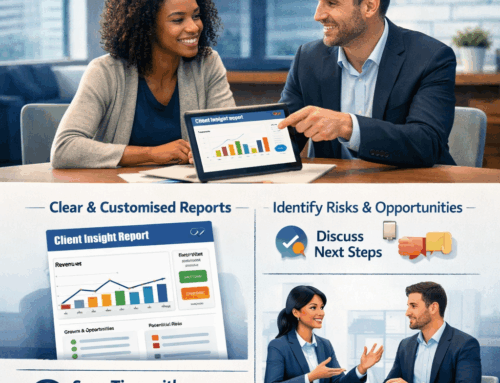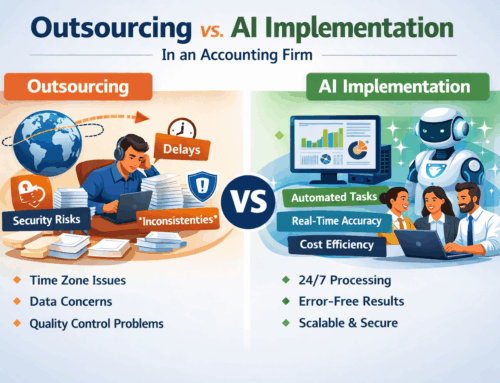The Ultimate Guide for Accountants: Entering the World of AI
Introduction: The AI Revolution in Accounting
Artificial Intelligence (AI) has become more than just a buzzword—it’s transforming industries, and accounting is no exception. As technology evolves, AI is no longer limited to tech giants; it’s now accessible, practical, and incredibly powerful for professionals in finance and accounting. From automating data entry to predicting financial trends, AI is opening the door to smarter, faster, and more accurate ways of working.
For accountants, this means moving beyond spreadsheets and calculators to embrace intelligent tools that think and learn—making their workflows more efficient and insightful than ever before.

Struggles Every Accountancy Practice Has Faced
Accounting is a rewarding profession, but it comes with its fair share of challenges:
Too Much Manual Entry: Endless hours spent keying in data leaves little time for client interaction and strategic work.
Lack of Upskilling Opportunities: Staff often spend so much time on repetitive work that they miss out on professional development.
Repetitive Work Leading to Burnout: The monotony of number crunching can increase turnover rates and lower job satisfaction.
Human Error: Even the most diligent accountant can make mistakes when dealing with vast datasets under time pressure.
Time Constraints: Balancing multiple clients and deadlines often leaves little room for innovation or long-term planning.
How AI Solves These Problems
Here’s where AI becomes a game-changer.
Reducing Manual Entry: Automation tools powered by AI can handle data processing in minutes, freeing up hours for client engagement and strategy.
Upskilling Through Technology: With AI taking care of repetitive work, accountants can shift their focus toward learning new analytical or advisory skills.
Decreasing Turnover: By removing the monotonous tasks, firms can improve employee satisfaction and retention.
Minimizing Errors: AI algorithms are built for precision—once trained correctly, they can handle data with a much lower error rate than humans.
Saving Time and Boosting Efficiency: AI can complete tasks that once took days in just a few clicks, helping accountants provide faster, more accurate results to clients.
The Great Debate
Not everyone in the accounting world is on board—yet.
Those for AI argue that it allows accountants to work smarter, not harder. They see AI as a tool that enhances human intelligence rather than replacing it. It offers scalability, consistency, and the ability to focus on high-value, client-focused services.
Those against AI worry about job displacement, data security, and the learning curve involved in adopting new technology. There’s also a cultural hesitation—some professionals feel that automation takes away from the personal touch that defines great client relationships.
In truth, the balance lies somewhere in the middle: AI doesn’t replace accountants—it empowers them to evolve into trusted advisors and strategic partners.
A Simple Guide to Getting Started with AI
If you’re ready to dip your toes into the AI waters, here’s a step-by-step guide to get started:
Assess Your Needs
Identify where your biggest time sinks are—data entry, reconciliation, or analysis—and target those areas first.
Research AI Tools
Look for accounting software with AI features like predictive analytics, automation, or smart categorization.
Train Your Team
Encourage your staff to learn how AI tools work and how to interpret AI-driven insights.
Start Small
Implement one AI solution at a time to avoid overwhelm. Test it, measure the impact, and scale up gradually.
Monitor and Measure Success
Track metrics such as time saved, accuracy improvements, and employee satisfaction. Use this data to refine your AI strategy.
Stay Curious
AI is constantly evolving. Keep up with trends and updates to make sure your firm remains ahead of the curve.
Conclusion: Change is inevitable (but it's a good thing)
AI isn’t the future—it’s the now. For accountants willing to embrace innovation, the possibilities are endless. By understanding the challenges, leveraging smart tools, and embracing continuous learning, you can transform your practice and elevate your role as a trusted advisor.
Bookmark this guide and come back anytime you need direction on your AI journey. And if you’d like to explore more about how AI and automation are shaping the accounting world, visit our website for resources, updates, and expert insights.




